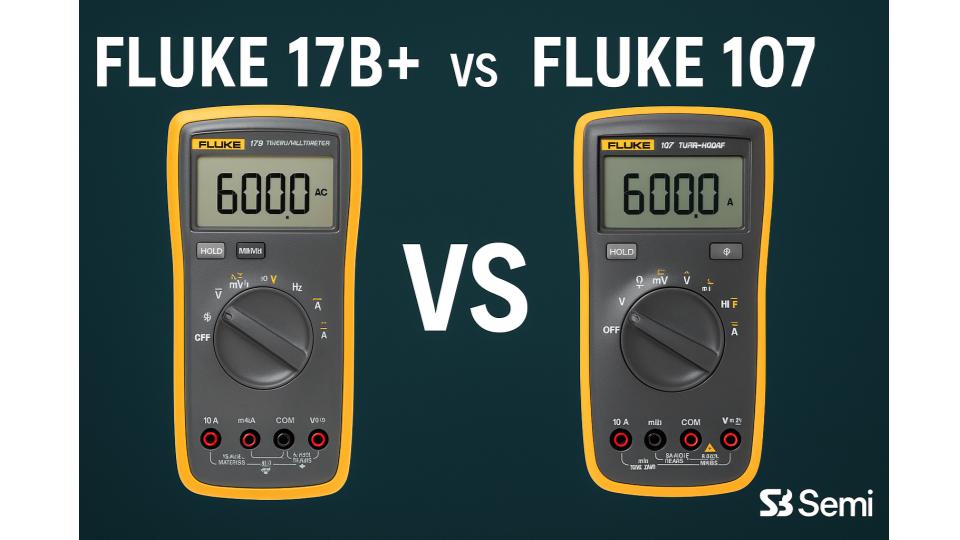Fluke is one of the most trusted names in electrical testing, and their compact multimeters are popular for both professionals and hobbyists. Two common choices are the Fluke 17B+ and the Fluke 107.
🏷️ Fluke Multimeter Deals ⭐⭐⭐⭐
While they may look similar at first glance, they serve slightly different needs. Let’s see how they compare.
📋 Quick Overview
- Fluke 17B+: A more advanced multimeter designed for technicians who need True-RMS accuracy, wider measurement ranges, and better display features.
- Fluke 107: A budget-friendly compact model with essential measurement functions and portability.
📊 Fluke 17B+ vs Fluke 107 Comparison Table
| Feature | Fluke 17B+ | Fluke 107 |
|---|---|---|
| Display | 6000-count LCD with backlight | 6000-count LCD with backlight |
| True-RMS | Yes | No |
| AC/DC Voltage | Up to 1000V | Up to 600V |
| Current Measurement | Up to 10A | Up to 10A |
| Resistance | Up to 40 MΩ | Up to 40 MΩ |
| Capacitance | Up to 10,000 µF | Up to 1000 µF |
| 💳 Pricing | 💲Check Price | 💲Check Price |
| Frequency | Yes | Yes |
| Temperature Measurement | Yes (with probe) | No |
| Continuity & Diode Test | Yes | Yes |
| Data Hold | Yes | Yes |
| Battery Type | 2 × AA | 2 × AAA |
| Size & Weight | Larger, ~455 g | Compact, ~200 g |
| CAT Rating | CAT III 600V | CAT III 600V |
| Extra Features | True-RMS, higher voltage, temp measurement | Lightweight, portable |
✅ Pros & Cons of Fluke 17B+
Pros
- True-RMS for accurate AC measurements
- Measures up to 1000V (vs 600V on 107)
- Wider capacitance range (up to 10,000 µF)
- Temperature measurement included
- Backlit display
Cons
- Larger and heavier than Fluke 107
- Costs more than the 107
- Slightly less portable
✅ Pros & Cons of Fluke 107
Pros
- Very compact and lightweight
- Backlit display
- Data hold function included
- Affordable entry-level option
- Easy to carry for quick troubleshooting
Cons
- No True-RMS (less accurate for non-linear loads)
- Lower voltage limit (600V max)
- Limited capacitance range (only up to 1000 µF)
- No temperature measurement
🛠️ Which One Should You Choose?
- Choose the Fluke 17B+ if you need True-RMS, higher voltage range, capacitance testing, or temperature measurement. It’s better for professional electricians and field technicians.
- Choose the Fluke 107 if you want a compact, affordable multimeter for quick checks, hobby work, or general troubleshooting.
Both are solid choices with Fluke’s trademark reliability, but the 17B+ is the more advanced tool, while the 107 is the more portable everyday meter.




